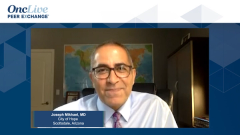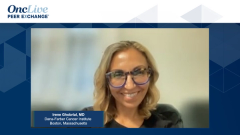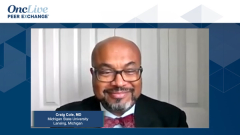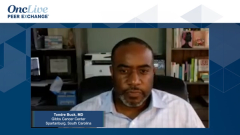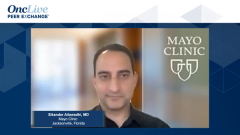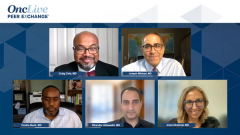
Societal Determinants of Health in Multiple Myeloma
Expert panelists shift their attention to how social determinants of multiple myeloma impact the treatment received by racial and ethnic minority groups.
Episodes in this series

Transcript:
Joseph Mikhael, MD: Excellent, that's helpful. On the subject of trying to figure out why and that is obviously this first module that we're looking at, Craig I'm going to turn to you for a moment because as a scientists we think maybe this is a biological phenomenon and Irene is doing all this great work in the PROMISE study and other groups are trying to evaluate this and study this but if there's anything perhaps the health equity movement has taught us in the last few years is it's a lot more than just biology. There are a lot of things at a societal level and several social determinants of health that influence the outcomes and clearly have a role in this disparity and for those who may not be as familiar with this concept; can you shed some light on this? Can you help us understand what are these determinants of health in multiple myeloma and how should we understand them better so that we can address this problem better?
Craig Cole, MD: The disparities that we see at its heart, a disparity is that you have 2 groups that have differences and incidence as Irene had mentioned and survival like you've mentioned. Some of the worst disparities are when one group is doing better than another group and with all the remarkable things that are happening in myeloma research. A lot of those disparities like you had mentioned kind of fall on people of color and those determinants of health sets that interplay with myeloma. One being health literacy or really lack of awareness that there are both significant delays in diagnosis of myeloma in people of color, part because of awareness. Emergency rooms and primary care doctors, when they see a patient that has anemia or they see a Black patient that has hypercalcemia, they're not thinking myeloma. We know that of the myeloma presenting signs and symptoms that hypercalcemia, anemia and renal failure are more common than lytic bone disease which is more of a common presenting symptom and sign in Caucasians. Also, patents, patients aren't aware of myeloma. You need a lot of health care literacy to discuss and know about myeloma and so again, health care literacy plays a big part. When you see a patient with renal insufficiency that's Black, part of that workup for renal insufficiency should be a serum free light change with ratio and a SPEP with immunofixation. Another one of those determinants of health is access to health care. We know that there are fantastic things that are happening in myeloma research that are happening at a lot of the centers. Everyone is working hard to find a cure for myeloma and access to some of those centers do improve survival. There have been several studies that show that just proximity to myeloma centers, having a primary oncologist, being able to communicate to a myeloma doctor improves survival and having those specialists. Also having access to those clinical trials and having access to stem cell transplant which we know improves progression free survival in myeloma so access to health care. Of course, there are multiple reasons why people of color don't have access to some of the centers of excellence, dovetailing into the other one; insurance coverage. Myeloma care is expensive, and the CDC has shown that there are fewer Blacks that have good insurance to be able to tolerate the financial toxicity of having myeloma. There have been several both multi-center studies and single institution studies that show that people with hybrid insurance live longer, have better progression free survival, better quality of life than those people with Medicare, Medicaid, and those without insurance. I worry about patients who don't have insurance that are too afraid to go to the health care provider if they have a disease like this. Then there are assumptions that physicians may have about patients' health care insurance; that they don't have enough money to afford a stem cell transplant, or they don't have money to afford some of the best therapies for myeloma. I've seen a patient treated with myeloma with just prednisone because somebody thought that they couldn't afford the novel drugs that we have for myeloma which isn't true. We can find ways to help with that. There are also language and geographic barriers to myeloma care. I had a patient who had to take a taxi, bus and train in order to see me for my therapy because she lived in the inner city and I was in this academic center so there are significant geographic- of course for our Latino population we have language barriers and cultural barriers that interfere. There are some behavioral and cultural determinants of health that influence that; diet and obesity, we also see that obesity is a risk factor for myeloma survival but also cultural distress for the medical system that if you have this spontaneous fracture of your arm that you're distrustful when your doctor wants to do multiple studies to figure out why. Then finally access to clinical trials; again, so many fantastic things are happening in myeloma research. You mentioned CAR-T, the bispecific antibodies, the novel new oral therapies for myeloma. The cutting edge of myeloma care and the cure lies with clinical trials- we know that over the past several years and Sikander has been really a pioneer in looking at the enrollment of people of color in clinical trials, being in the single digits for FDA approved trials and that is just opportunity for people of color to be involved in those trials and get that best therapy. Those are some of the social determinants of health and of course when you over arch that, things like systemic racism and kind of the atrocities that happened in clinical trials years ago kind of bear down to have those things still exist today.
Joseph Mikhael, MD: Wow. Thanks, Craig. I could listen to you for hours my friend. You align it so clearly. On the other hand, it's painful to hear you say these things because they are such a long list as you've noted but nonetheless I think raising awareness around this is critical. I'm thankful that we can have this discussion today because there are those who might just say I'll listen to the biological phenomenon and maybe the insurance phenomenon, that's a bit more obvious but there are so many more of those subtleties. I appreciated that you spent a little bit of time helping us understand how real the geographical, language, behavioral, cultural barrier that could be and indeed the lack of trust within the system. It's going to take a Herculean effort but a doable effort nonetheless overcoming many of these.
Transcript edited for clarity.


